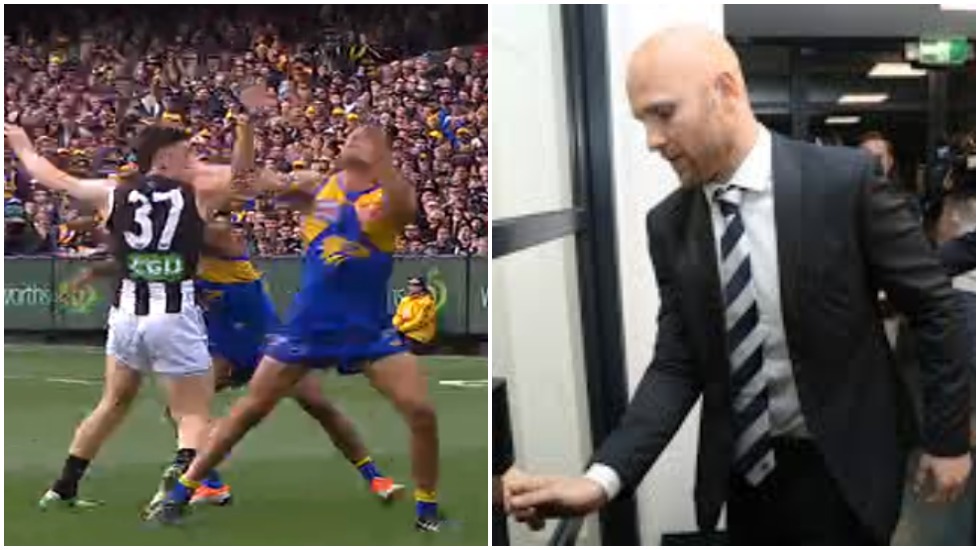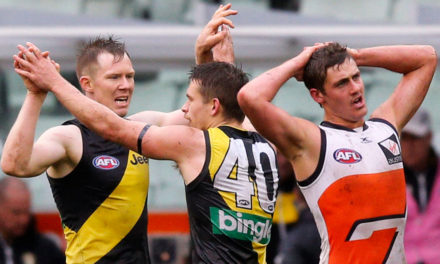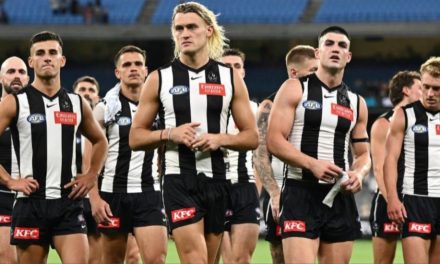Willie Rioli’s block on Brayden Maynard in last year’s grand final, and Gary Ablett entering the AFL Tribunal this week.
I’ve been a football follower for 47 of my 54 years. I can’t remember a single moment in that entire period when the vast bulk of footy fans have been satisfied with either the standard of umpiring or the judiciary.
I can’t imagine it’s much different for fans of other team sports. You follow a side, and like it or not, it tends to shape your perceptions. If decisions go your team’s way, it’s only right. If they don’t, often enough it’s because your boys copped the rough end of the pineapple, not actually transgressed.
Those decisions are sources of endless football debate. But never debates which can be won, because like so many things in our game, they are interpretative calls without definitive rights and wrongs.
But the circular arguments go on. And on. And on. In fact, it feels like the football public these days talks about umpiring and tribunal decisions more frequently and with greater vigour than just about anything else in the game, the latest example Gary Ablett’s one-week penalty, subsequently overturned.
Why do we talk endlessly about this stuff? I can think of a couple of possible reasons. One is that with cynicism about the operation and motives of the AFL administration at an all-time high, rightly or wrongly, the punters see wolves at every possible door, whether through deliberate scheming or amateurish sloppiness.
Another is the accessibility of the conversation. Game analysis is becoming a trickier business these days, commandeered in the media largely by former players with access to a bewildering array of statistics the average fan doesn’t.
It can feel intimidating to the average supporter to buy into a conversation about how this or that team or player is going unarmed with their contested ball numbers, defensive ground ball gets or heat maps.
But most fans feel like they have a working enough knowledge of the rules, and when it comes to the Match Review Officer and AFL Tribunal, the offence gradings, to be able to venture an informed opinion.
How interesting are those debates? Well, frankly, I find endless natter about umpiring and the tribunal pretty boring. Partly because, after the fact, the point is always moot. But mostly, because they generally operate from a premise of a conspiracy that simply doesn’t exist.
Do umpires get it wrong? Sometimes, of course. Do those decisions cost teams games? Absolutely not, in my view. For every dodgy free kick, you can find half-a-dozen dodgy decisions made by players who got their calculations or skills wrong and in doing so cost their side far more than a contentious umpiring call.
Take that famous moment with two minutes left on the clock in last year’s grand final, when West Coast’s Willie Rioli shepherded out Collingwood’s Brayden Maynard to allow Dom Sheed to mark and kick what proved the match-winning goal.
Contentious? Yes, but I’ve seen more of those situations let go, as this was, than free kicks paid. And it’s important to remember what came in the remaining 105 seconds after the goal umpire gave the all clear on Sheed’s kick.
The very next centre bounce, wasn’t straight, and gave Collingwood ruckman Brodie Grundy a free tap which opponent Nathan Vardy couldn’t contest. It wasn’t recalled. From the resultant clearance, Josh Kennedy kicked out wide where Sheed took the ball and was tackled by Maynard, who took him high. No free kick was paid.
Sheed still got the ball out to Luke Shuey, who centred the ball to an unattended Jack Darling. That should have been game, set and match, but Darling dropped an absolute sitter. In the chaos which ensued, Magpie Jeremy Howe tried to burst out of the goal square and was nailed by Rioli. Holding the ball? It wasn’t paid, but it could have been.
From the ball-up, Steele Sidebottom rushed a behind. With 58 seconds left by now, Maynard took the kick-in. Understandably, he elected to go with a barrel. But he didn’t connect properly, it fell short, and into the arms of Shuey, who soaked up the next 25 seconds. Perhaps a more regulation drop punt might have found a teammate.
That’s all in less than two minutes. How many such instances from 44 players and three umpires were there in 120?
Do umpires favour particular teams or players? Again, in my view, absolutely not. These guys are well-paid and under constant scrutiny from above, let alone the grandstands. They’d last about five seconds in the caper at the elite level were any prejudices to manifest themselves in their decision making.
Does Match Review Officer Michael Christian and the tribunal get it wrong? Occasionally, though I believe not nearly as often as some think. And certainly not because they’re “looking after” someone.
What about the Ablett case? Personally, I thought he was a little stiff to get a week in the first place, so the tribunal’s decision to overrule Christian didn’t surprise me at all.
What about the precedents cited? They were Hawthorn’s James Cousins’ strike on Carlton’s Sam Petrevski-Seton, and Richmond defender Dylan Grimes’ hit on Collingwood’s Jamie Elliott, both of which earned one-week suspensions.
But I felt there was a significant enough difference between those two and Ablett’s case. Both Cousins and Grimes clearly made contact with a forearm which was braced, anticipating contact (significantly later after disposing of the ball, too), making it hard to argue anything other than deliberate attempt to contact the opposition player.
Ablett’s contact with Essendon’s Dylan Shiel was more of a glance, but more importantly, was made with an arm held loosely and not cocked or braced for a collision. That, to me, signified a lack of intent, and therefore a classification of “careless” rather than “intentional”.
Hence the downgrade to a fine. Was it because of who the player in question was? Well, call me crazy, but I think if there were any sub-conscious factors at play, it might have been along the lines of not wanting to be seen as playing favourites rather than the opposite.
I’ve been covering the game professionally now since 1983. Without exception, every single year at some stage I will read, hear or see a claim that (a) umpiring is the worst it’s ever been, and (b) the game’s judicial system is a joke.
After a while, you tend to take those claims with a grain of salt. And feel like asking those making the claim: “So which season of umpiring/tribunal decisions was better, and why?” The question is pointless, of course, because no one thinks about it long enough to be able to cite specific examples. Without which, the arguments don’t really stack up.
Australian football is a game which relies on interpretations of rules, both on the field and in the tribunal room, arguably more heavily than any other football code. There are very few absolutes.
So forgive me when my eyes start glazing over after hearing for the 500th time that “team/player X always gets a good run from the umpires/tribunal”. They/he don’t. They just get the rub of the green sometimes, and sometimes not.
There’s a popular mantra that if there’s a choice between a conspiracy and a stuff-up, it’s usually the latter. But on this eternal football question, I honestly believe more often than not, it’s in fact neither.











